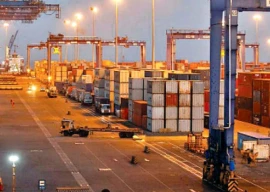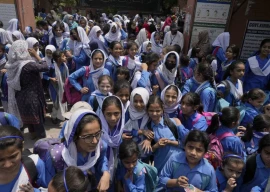
The new government has got off to a good start, as it appears to have consolidated its fiscal position in first two months of the current fiscal year, restricting budget deficit to 0.8% of gross domestic product or Rs208 billion.
In percentage terms, the gap between national income and expenditure in July and August stood at the same level as in the corresponding period of last fiscal year and was in line with this year’s annual deficit target of 5.8% of GDP, according to provisional results.
However, in absolute terms, the deficit was Rs20 billion higher than the same period a year ago.
The figures seem encouraging, especially after the previous fiscal year recorded a huge deficit at Rs1.833 trillion or 8% of GDP.
The last PPP government too had a good start in the first two months of the previous fiscal year, but later massive slippages occurred and state revenues were consumed for political gains ahead of May 11 general election.
According to officials, the current fiscal year is distinct from the previous one because of an agreement with the International Monetary Fund for a $6.7 billion loan programme that binds the government to remain within permissible limits.
“The arrangement with the IMF is sacrosanct for us and the government will monitor macro indicators on a monthly basis,” said Rana Assad Amin, spokesman for the finance ministry.
He said the central government was continuously pushing the Federal Board of Revenue to step up efforts, as its performance was the key to meeting this year’s budget deficit target.
According to the figures, net federal revenues, excluding the share of provinces, were Rs207 billion against total expenditures of Rs474 billion, showing a shortfall of Rs267 billion or slightly over 1% of GDP.
The federal government transferred Rs212 billion to the four provinces under the divisible pool, of which the federating units saved Rs59 billion. These savings brought the overall deficit down to 0.8% of GDP.
Under an IMF condition, the provinces for the first time are required to notch up a minimum Rs117 billion in savings in the current fiscal year.
However, a detailed review of income and expenditure showed that the government’s decision to take away Universal Services Fund of private telecom companies helped economic managers save face.
In July this year, the Economic Coordination Committee of the cabinet decided that the Rs67 billion USF deposited by private telecom companies would be placed in the federal consolidated fund. This came despite opposition from telecom companies.
The USF helped reduce the deficit by 0.3%. Had the government not taken that money, the deficit would have been 1.1%.
Another factor that led to a manageable deficit was the move to restrict government’s development expenditure to just Rs17 billion, a mere 3.1% of the annual federal Public Sector Development Programme of Rs540 billion.
As a contingency measure, the federal government has assured the IMF that it will slow down releases for development projects in first nine months of the fiscal year to save Rs130 billion so that the 5.8% deficit target could be met.
Contrary to 3.1% development expenditure, the current expenditure in July and August stood at Rs457 billion, 15% of the annual current spending target. Out of Rs457 billion, Rs207 billion went for debt servicing.
In the first two months, the FBR bagged Rs275 billion in taxes, 11.2% of its annual target of Rs2.475 trillion. The IMF has already stated that the FBR will miss the target by Rs130 billion. Non-tax collection, including USF money, remained at Rs144 billion.
Published in The Express Tribune, September 18th, 2013.
Like Business on Facebook, follow @TribuneBiz on Twitter to stay informed and join in the conversation.
COMMENTS (5)
Comments are moderated and generally will be posted if they are on-topic and not abusive.
For more information, please see our Comments FAQ

1720097164-0/BeFunky-collage-(9)1720097164-0-165x106.webp)


1734567485-0/Untitled-design-(54)1734567485-0-165x106.webp)



1722065362-0/BeFunky-collage]-(56)1722065362-0-270x192.webp)


1734468458-0/Copy-of-Untitled-(50)1734468458-0-270x192.webp)

1734511806-0/Untitled-design-(5)1734511806-0-270x192.webp)









V poor performance I mean they are no differen from PPPP if it had not been an election year
I was expecting better from PML N i am wirries that i voted wrong people I expected better performance in taxes which other than sale tax has shown no improvemebt at all. The direct tax cillection and state insitutes defcit will be the deciding factors for PML N oerformance
What didnt you guys read?
1) Without the transfer of USF Funds, which is to be used for telecom coverage enhancement in rural/poorer areas, the budget deficit was 1.1% (which tranlates into a min budget deficit of 6.6%) 2) Furthermore.development spending has slowed down. Govt spent only 3.1% of development funds. At this rate they will spend <20% of the budgeted funds. Without development expenditures (appropriate ones ofcourse) we will not see sustainable long term growth. Can you name me one country which became a powerhouse without high levels of development expenditure??
Without true reforms within FBR and bureaucracy, we can only hope that things get better.....The government needs to show some political will and fast track these reforms (broader taxation is just one aspect of it). Unfortunately right now they are not even thinking of them
Great to finally hear some positive news coming out of the country. Growth will only come once further cleansing of the fiscal mess is done with consistency. Increasing the tax-payer net would pay dividends in the long run.
Good start. All the best!
PMLN this nation owes you!